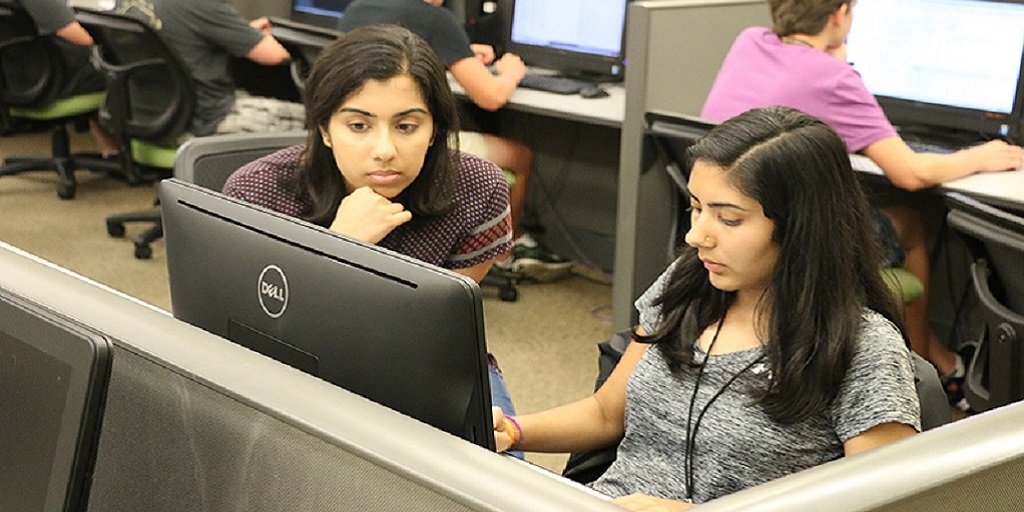In the past thirty years, women have made considerable progress in the job market in the USA and Europe.
Today, more women go to universities and occupy management roles in fortune 500 companies than ever before.
Although these improvements in the quality and quantity of jobs done by women are impressive, there is a critical area where it is lagging.
The fastest-growing market segment in the past 30 years has been high-tech, especially software development.
But precisely in this area, women have not made progress and in fact, are falling behind.
In 2015 Emily Peck a senior writer for Huffington Post wrote a fantastic article on this subject. You can read the full article here.
The article written by Emily is based on a research study done by the American Association of University Women (AAUW) in 2013. You can read that article here.
If you are interested in more details, check the PDF file which has a lot more information and charts.
The article by AAUW published the result of a study as to why there are so few women working in science, math, and Engineering.
We have been actively trying to diversify our workforce and hire more female software engineers and mathematicians.
The reason for this might be self-serving, but still valid. A lot of our customers are women professionals and we need a woman’s perspective when we design our tools.
Hiring women software engineers has proved to be extremely difficult.
We have engineers in the USA, Eastern Europe, and Israel. Most of our staff work remotely and we pay competitive salaries.
You might think, we should have an easy time finding female engineers to work on our projects. So far we have come short. Out of 15 engineers working at Binfire, only one is a woman.
So why is so hard to find women software engineers or software test engineers?
To find the answer, I started to research and read about this subject. That is when I saw Emily’s article and via that the article written by AAUW.
I agree with all the points stated in the research paper, but I think a big glaring issue is missing there.
And that issue is the peer pressure that exists in our society for girls to shy away from learning math and science in elementary and high school.
I have faced this problem in my personal as well as professional life. I have two sons and one daughter. All three are very gifted in math and science subjects.
Both My sons studied engineering (one biomedical and the other software engineering). Both are happy about their choices and are happy and successful with their careers.
My daughter just started studying computer science at Tel Aviv University. Out of 300 girls who graduated in 2016 with her in high school for girls, she is the only one who is enrolled in any science, math, or engineering program.
That is one huge problem and a huge loss for our society. Many of her classmates were really good at math and Physics.
In fact, a few of her friends joined my daughter in the First Robotic Program. These girls participated in the FRC program from 8th grade through 12th grade.
The fact that my daughter is the only one among her classmates who are studying science or engineering, has been very difficult for her.
She feels that she is an outcast for not joining other girls studying other disciplines like Law, medicine, or business in college.
To her, it seems she is losing all her friends. She is trying to find new friends at the university, but there are few girls in her classes too.
So why out of 300 girls finishing high school, only one is pursuing a technical degree?
One problem is that most girls are not encouraged by their families and society to learn math in elementary school.
Even worse, girls who are smart and good at math are labeled nurds and not cool.
Girls are encouraged by their parents, family, and peers to study other subjects and not technical studies.
This is unacceptable. If we have more women working in tech in western societies, it will improve the salary gap between women and men.
This is even more critical in developing countries. If more women study science and engineering they can find good jobs and great pay. This will lend to more independence and greater freedom for women in those countries.
To remedy this problem, we at Binfire have decided to establish a scholarship fund to encourage more girls to study science and engineering in higher education.
This is a merit scholarship given to 5 high female high achievers studying technical subjects in a four-year accredited college and University. For more detail check here.
We sincerely hope more young women pursue technical studies in colleges and universities. This will help reduce the severe labor shortage in the high tech while helping women narrow the salary gap.
It is obvious that more women are needed in high-tech to help both western and developing countries to grow faster.



